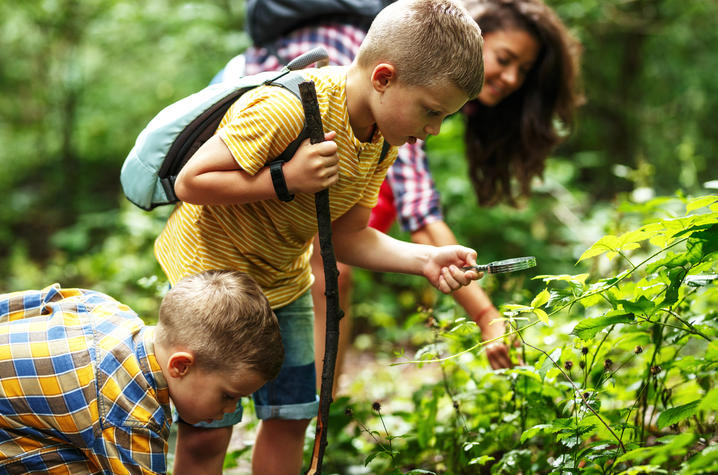Take a Break and Step Outside; Tips For Keeping Families Active Outdoors

LEXINGTON, Ky. (March 23, 2020) – Social distancing and social isolation can be difficult for both parents and kids. The disruption in routine can be stressful, so it’s important to take time during the day and step outside. Below is a list of suggested activities from 4-H specialists for families who need to get out of the house.
- Forest teepee - Spend some time out of doors with our family constructing a “forest teepee” out of branches, rocks, leaves and other natural materials. This is a great way to focus a child’s energy and attention on activity and makes a great playhouse.
- Nature scavenger hunt - Send the family out on a nature scavenger hunt. Make a list of things normally found in your neighborhood, park or other outdoor location. See how many of the items can be found in the specified time. Take pictures of what you find. This is a great way to tie in existing schoolwork - you can tailor a scavenger hunt with almost any focus, such as math, as you encourage them to find one rock, two feathers, three pinecones, etc.
- Natural colors - Give each person in the family some crayons, paint samples, markers or pencils and start searching for colors in nature. When the find one that “matches” they get a point. This is another way to get kids active and moving.
- Listening walk - Take the family, – or just yourself – on a walk. Make a list of the sounds you hear. Encourage an age-appropriate “recording” of what they heard in a blank book, journal or composition notebook. This encourages listening, helps center and focus a child, and promotes writing and art.
- Start a garden - Now is a perfect time to start seeds indoors so you can enjoy fresh vegetables into the summer. If you don’t have the space to create an in-ground garden, container gardening is a great way to grow vegetables in limited space. Your county extension office has publications on container gardening and gardening for both youth and adults.
- Community service - Think about the needs of your community that you can help with while maintaining social distancing. Park or road clean-ups, card writing, trail clearing, weeding a neighbor’s flower bed are all things that can be done by an individual or family to help those in need. Call your neighbors and speak on the phone or Facetime friends and family. Social distancing does not mean social isolation, so let’s help others feel connected.
- Nature watching - Spend some time watching nature. This helps young people and adults relieve stress, feel more focused, and connects them to the world around you.
- Outside crafts - There are a lot of crafts that can be done outdoors, such as concrete stepping stones or bird feeders. Look online or at your local hardware store.
- Family bingo - Create a bingo card with items you might see around the neighborhood, such as a blue truck, red trash can or white flowers). Swap bingo cards with another family member, and walk around the neighborhood and mark off items as you find them.
- Garage animals/bugs - Create a “bug” or a “never before seen animal" using items you find in your garage. Give the bug/animal a name and describe what special abilities it has.
- Driveway tic-tac-toe - Play a game of tic-tac-toe in the driveway. Use sidewalk chalk or sticks from the yard to create the “board” and use tupperware lids or play balls as the X's and O's.
- Draw your house - Sitting in the front yard, draw your house using pencil/paper, colored pencils, markers, or ink pens. Draw your family members doing something fun in the yard and then tell the story to your family members.
- Roof ball - Play a game of "Roof Ball.” Family members take turns throwing a ball on their roof. Rules can vary depending on age, such as don't let the ball hit the ground, don't let the ball bounce more than once, or your feet can't touch the ground while you're throwing the ball.
- Geocaching - There are lots of free apps that can be downloaded and used to find “caches” in parks, neighborhoods, natural or urban areas. This is an exciting way for families to bond together.
- Have a backyard family campout – Take some blankets outside and watch the stars, or listen to nature at night. Bring dinner and make it a picnic.
- Make a solar oven - Make lunch or dinner outside. Learn more at https://www1.eere.energy.gov/education/pdfs/solar_oven.pdf
Mark Mains, Ph.D., is the assistant director of 4-H youth development in the UK College of Agriculture, Food and Environment.
As the state’s flagship, land-grant institution, the University of Kentucky exists to advance the Commonwealth. We do that by preparing the next generation of leaders — placing students at the heart of everything we do — and transforming the lives of Kentuckians through education, research and creative work, service and health care. We pride ourselves on being a catalyst for breakthroughs and a force for healing, a place where ingenuity unfolds. It's all made possible by our people — visionaries, disruptors and pioneers — who make up 200 academic programs, a $476.5 million research and development enterprise and a world-class medical center, all on one campus.




